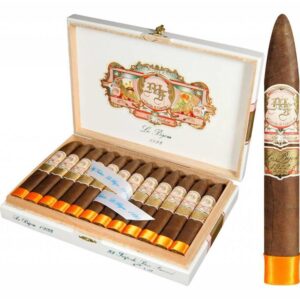Subtotal: $532.45
For any true cigar aficionado, a cigar is more than just a smoke; it’s a moment of relaxation, a taste of history, and a sensory experience. But that experience can be ruined if the cigar isn’t stored correctly. The flavor, aroma, and overall quality of a cigar are incredibly delicate, and improper storage can lead to a dry, brittle, or moldy product. The key to preserving your cigars and their unique flavor profile is to control their environment. This guide will walk you through the essential steps to ensure your cigars remain in perfect condition, ready for that perfect moment.
The Golden Rule: Temperature and Humidity
Cigars thrive in a very specific environment. The “golden rule” for cigar storage is to maintain a temperature of around 70°F (21°C) and a relative humidity (RH) of 70%. This combination is often referred to as “70/70” and is the industry standard for optimal storage.
- Humidity is key: A cigar that is too dry will become brittle, leading to a quick, harsh burn and a loss of flavor. A cigar that is too moist can swell, preventing a proper draw, and is highly susceptible to mold. The ideal humidity keeps the tobacco supple, allowing for an even burn and the full release of its complex flavors.
- Temperature matters: Storing cigars in a space that is too hot can cause the oils in the tobacco to “cook,” ruining the flavor and potentially inviting tobacco beetles. A temperature that is too cold will slow down the aging process and can make the cigars dry out. A stable, moderate temperature is your best friend.
Your Best Friend: The Humidor
A humidor is the most effective and essential tool for any cigar lover. A good humidor is designed to maintain that crucial 70/70 environment.
- Types of Humidors: Humidors come in various sizes and materials, from small, portable travel humidors to large, walk-in humidor rooms. The most common are desktop humidors, typically made of Spanish Cedar.
- Spanish Cedar is King: Spanish Cedar (a type of wood, not a true cedar) is the preferred material for humidors for several reasons. It holds moisture well, which helps regulate the humidity. It has a natural aroma that positively interacts with the cigars over time, enhancing their flavor. Lastly, it acts as a natural deterrent to the dreaded tobacco beetle.
- Seasoning Your Humidor: Before you place a single cigar inside, you must “season” your humidor. This involves slowly raising the humidity of the wood itself to the desired level. A common method is to wipe the interior with a damp, distilled water-soaked cloth and then place a humidification device inside until the hygrometer (the humidity gauge) reads a stable 70% for a few days. Skipping this step will result in the dry wood absorbing moisture from your cigars.
Humidification and Monitoring
Once your humidor is seasoned, you need to maintain the humidity.
- Humidification Devices: Most humidors come with a built-in humidification device, which can be a simple sponge, a polymer crystal-based unit, or an electronic system. The key is to use distilled water or a special propylene glycol solution. Tap water contains minerals and impurities that can clog the humidifying element and encourage mold growth.
- The Hygrometer: A hygrometer is a crucial component for monitoring the humidity level inside your humidor. Digital hygrometers are generally more accurate and reliable than their analog counterparts. Make sure to calibrate your hygrometer periodically to ensure it is giving you an accurate reading.
- Placement Matters: Place your humidor in a stable environment, away from direct sunlight, air conditioning vents, or heating sources. Fluctuations in temperature can cause the humidor’s humidity to swing, which is bad for your cigars.
Common Storage Mistakes to Avoid
- The Kitchen Sink Method: Do not store cigars in your refrigerator. While it’s cool, a refrigerator is a very dry environment that will strip all the moisture from your cigars, leaving them a brittle, flavorless wreck.
- Ziplock Bags: While a Ziplock bag with a humidification pack can be a temporary solution for a short trip, it’s not suitable for long-term storage. It doesn’t offer the same level of environmental control as a dedicated humidor.
- Ignoring Your Cigars: It’s a good practice to regularly check on your cigars and your humidor’s humidity levels. Rotate your cigars occasionally to ensure even aging and humidity distribution.
Proper cigar storage is a small but critical investment of time and care. By maintaining the right temperature and humidity in a quality humidor, you ensure that every cigar you smoke is a perfect representation of its intended flavor and craftsmanship. So, take the time to store them correctly, and you’ll be rewarded with a truly exceptional smoking experience every time.

 My Father Le Bijou Torpedo Bx/23
My Father Le Bijou Torpedo Bx/23  My Father The Judge Grand Robusto
My Father The Judge Grand Robusto